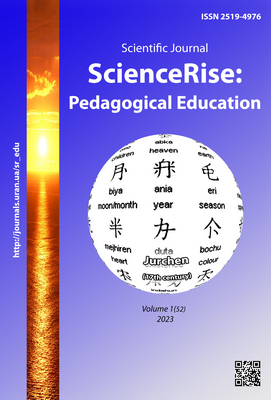Гра дітей в умовах війни в Україні очима педагогів
DOI:
https://doi.org/10.15587/2519-4984.2023.275023Ключові слова:
гра, війна, дошкільники, вихователь закладу дошкільної освіти, фасилітація, післядипломна освітаАнотація
Здійснюється аналіз результатів дослідження особливостей ігрової діяльності дітей дошкільного віку в умовах війни в Україні, що було проведено у двох регіонах країни, які суттєво відрізняються характеристиками перебігу воєнних дій, життєдіяльності населення (на тимчасово окупованій території України та підконтрольних українських територіях), а також особливостями діяльності закладів дошкільної освіти. Завдання дослідження полягали у: з’ясуванні змін у змісті, видах та організаційних формах ігрової діяльності дітей дошкільного віку в умовах війни за результатами спостережень вихователів закладів дошкільної освіти; виявленні рівня усвідомленості вихователями ресурсів гри як дієвого інструменту психосоціальної підтримки дітей в умовах війни; визначенні потреби вихователів у розвитку їх умінь щодо фасилітації ігрової діяльності дітей в умовах війни для запровадження відповідних заходів у системі післядипломної педагогічної освіти; апробації діагностичного інструментарію для подальших досліджень. Результати здійсненого дослідження засвідчили про те, що: 1) війна в Україні суттєво змінила ігрову діяльність дітей дошкільного віку порівняно з довоєнним періодом, що виявляється у: домінуванні різних сюжетів воєнних дій у змісті гри та програванні дітьми нових ролей (виключно позитивного характеру – військових, рятівників, пожежників, волонтерів, лікарів, будівельників та ін.), зумовлених новою воєнною реальністю; активному використанню дітьми іграшкової зброї та іграшок-замінників сучасної зброї; збільшенні часу на комп’ютерні ігри, у тому числі воєнної тематики; зменшенні часу на гру в цілому та вільну гру зокрема; відмові дітей від шумних, рухових ігор на користь тихих, малорухливих ігор наодинці; зростанні потреби дітей у більшій увазі дорослих у процесі гри; емоційній збудженості дітей, домінуванні негативних емоцій у грі; збільшенні ваги творчої діяльності в щоденній активності дітей, у тому числі – у грі. Зазначені зміни виявляються як в ігровій діяльності хлопчиків, так і дівчат дошкільного віку; 2) вихователі закладів дошкільної освіти усвідомлюють важливість гри для підтримки благополуччя дитини в умовах війни, вважають рівень власних знань та умінь з підтримки ігрової діяльності дошкільників в умовах війни недостатнім, а також розуміють гостру потребу в їх додатковій підготовці у закладах післядипломної освіти з питань фасилітації гри дітей в надскладних умовах життя
Посилання
- The right of the child to rest, leisure, play, recreational activities, cultural life and the arts (Article 31). Committee on the Rights of the Child (2013). General comment 17. Available at: http://ipaworld.org/childs-right-to-play/article-31/general-comment-17
- Feldman, D. (2019). Children’s Play in the Shadow of War. American Journal of Play, 11 (3), 288–307.
- Bankova, P. (2017). Children play war. The Belogradchik Journal for Local History, Cultural Heritage and Folk Studies, 8 (1), 113–132.
- Caillois, R. (2001). Man, Play, and Games. University of Illinois Press, 224 p.
- Hyder, T. (2005). War, conflict and play. Maidenhead, England: Open University Press, 113.
- Heikkilä, M. (2021). Boys, weapon toys, war play and meaning-making: prohibiting play in early childhood education settings? Early Child Development and Care, 192 (11), 1830–1841. doi: https://doi.org/10.1080/03004430.2021.1943377
- Levin, E. (2006). Diane, Nancy Carlsson-Paige. The War Play Dilemma: What Every Parent and Teacher Needs to Know. Teachers College Press, 124.
- Heizinha, Y. (1994). Homo Ludens. Kyiv: Osnovy, 250.
- Loboda, Yu. O. (2014). War and game in cultorologic conception of J. Huizinga. Hrani. Filosofiia, 10 (114), 23–24.
- Eisen, G. (1990). Children and Play in the Holocaust: Games among the Shadows. University of Massachusetts Press, 168.
##submission.downloads##
Опубліковано
Як цитувати
Номер
Розділ
Ліцензія
Авторське право (c) 2023 Tetiana Gura, Oksana Roma

Ця робота ліцензується відповідно до Creative Commons Attribution 4.0 International License.
Наше видання використовує положення про авторські права Creative Commons CC BY для журналів відкритого доступу.
Автори, які публікуються у цьому журналі, погоджуються з наступними умовами:
1. Автори залишають за собою право на авторство своєї роботи та передають журналу право першої публікації цієї роботи на умовах ліцензії Creative Commons CC BY, котра дозволяє іншим особам вільно розповсюджувати опубліковану роботу з обов'язковим посиланням на авторів оригінальної роботи та першу публікацію роботи у цьому журналі.
2. Автори мають право укладати самостійні додаткові угоди щодо неексклюзивного розповсюдження роботи у тому вигляді, в якому вона була опублікована цим журналом (наприклад, розміщувати роботу в електронному сховищі установи або публікувати у складі монографії), за умови збереження посилання на першу публікацію роботи у цьому журналі.









